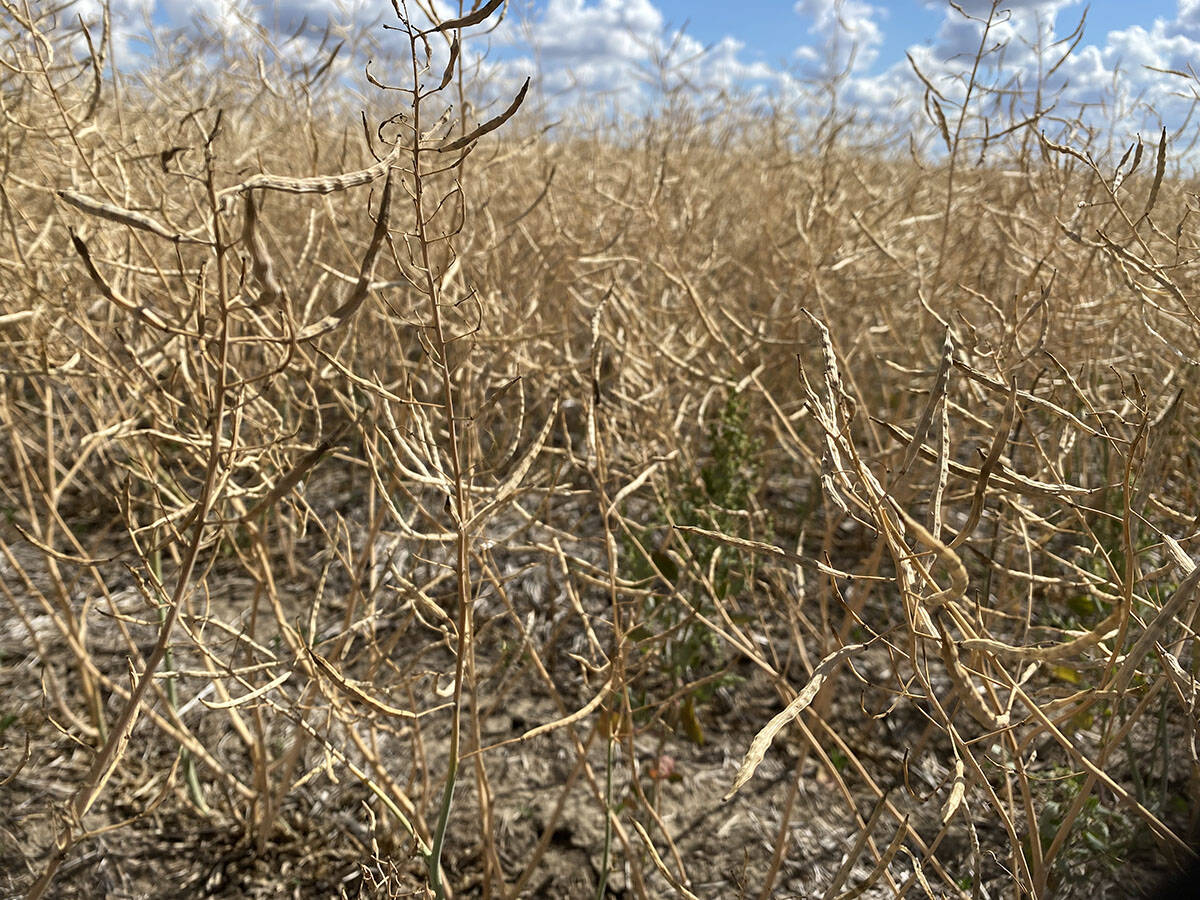What’s the rush?
A report released in Ottawa urges the Conservative government to move quickly in dismantling the Canadian Wheat Board.
This recommendation is a follow up to a July 27 closed-door meeting the new Conservative government had with some anti-wheat board farmers and grain industry representatives in Saskatoon.
Why the big hurry? Could it be the government is afraid farmers will come to realize this is nothing more than another attack on their incomes?
The news is out, the CWB returns to grain producers $800 million each year above the world price because of the marketing power of the single desk. An example of this would be with CWB marketing all wheat and barley while farmers still retain ownership of this grain, not the board, so, all premium prices come back to the producers.
Read Also

Crop insurance’s ability to help producers has its limitations
Farmers enrolled in crop insurance can do just as well financially when they have a horrible crop or no crop at all, compared to when they have a below average crop
Without the board marketing, the grain will be sold to the private grain companies, as is done on the open market now, and it is not reasonable to expect them to market in the interest of farmers. …
As I write this, I recall other actions by government that have severely reduced the incomes of western grain producers.
Was it not government action that took away the statutory freight agreement known as the Crow Rate? I hardly need ask how much that reduces each farmer’s yearly income. They already know.
Not long after the Crow took flight, more government action dismantled the two-price wheat agreement and another $300-$400 million up in smoke each and every year.
Now, the latest planned action against the CWB by the new Conservative government will blow another gigantic hole in the western grain producer’s paycheque for years to come. Strangely, some farmers actually support giving away the only market power they have on the world scene.
… I ask of western farmers, are you going to let the members of Parliament you helped elect attack your income again?
– Henry Neufeld,
Waldeck, Sask.
Gopher idea
I got the Sept. 14 issue of the Western Producer. I read with interest the article about gopher damage. We used to have serious gopher damage years ago. I was born in 1927 and as a young boy I made most of my spending money trapping and shooting ground squirrels. They were thick in this area until 1942.
Sometime before that, a disease that affects most rodents was brought into southern Idaho to control jackrabbits. It spread to our area about 1941 and caused the rodent population to vary widely from year to year.
In fact, the predators that depended on rodents for food reduced greatly since then. Rabbits, cavies, marmots and mice have been rare in this area since then. I think importing diseased jackrabbits or ground squirrels into the problem areas would go a long way to relieve the gopher problem.
I find your paper very informative, more so than American publications.
– George Thompson,
Nezperce, Idaho
Steam rolling
I wonder, in disbelief, why is it that in spite of all the opposition from the supporters of the Canadian Wheat Board, the minister of agriculture, the honourable Chuck Strahl, is steamrolling ahead with changes to the board.
He claims the change was an election promise he must meet no matter what the end result will be. I wonder if the grain trade and supporters for the questionable dual system contributed much more to his campaign fund than the supporters of the CWB and that is all that matters. Just look at who he has named to help divide the pie. My only hope is that the courts will use common sense and not allow this tragic change to take place.
– William J. Shwaluk,
Shoal Lake, Man.
Much mayhem
In the last few weeks, letters have appeared in Open Forum where various proponents of the Canadian Wheat Board draw a comparison between democracy, the CWB and the business of selling wheat.
When did the federal Liberals ever consider what we wanted in Western Canada? From its very onset in 1935, the CWB was used as a tool to provide cheap food for Canada and its allies. It had nothing to do with providing western Canadian farmers with better prices and more lucrative markets, and it had nothing to do with democracy.
Think for a moment. Why was the large rural vote of Quebec and Ontario excluded from having to adhere to the CWB’s stringent rules? Where was the democratic process when Pierre Elliot Trudeau forced us to change our acres and feet along with bushels and gallons to the much-despised metric system?
How about Ralph Goodale’s “scrap the Crow” campaign, a move that drove a dagger through the heart of every family farm in the West? Where was democracy when they scuttled our Net Income Stabilization Account program in lieu of Canadian Agricultural Income Stabilization, the biggest Liberal boggle outside of the sponsorship program and same sex marriage?
Where was the democratic system when (Jean) Chrétien and Allan Rock took away our rights as rural gun owners?
The list goes on.
The new government needs more than six months to rectify the mayhem that was bestowed upon us by Ottawa in the last 15 years.
It is the first democratically elected government in Canadian history, in a sense that Western Canada made a difference. But that’s a story for another time.
– John Hamon,
Gravelbourg, Sask.
CWB advantage
Farmers should really consider what they are asking, to have the individual right to choose how one markets the fruits of a person’s labour as an Alberta farmer, selling grains.
I feel I would have an unfair advantage over my fellow Albertans. Our teachers, nurses, doctors, police and some government employees do not have that individual choice to negotiate on an individual basis the efforts of their labour, and yet their sector of society appears to be doing very well.
I have always wondered if the proponents of individual choice could convince the OPEC members to abandon their single desk selling system. Correct me if I am wrong, but before OPEC was formed, Middle East oil producers were selling oil from $1.50-$1.75 a barrel. When OPEC was formed and went to single desk selling system, oil went from $9.50-$11 a barrel.
We as Albertans benefited by that. All around I see amalgamation and consolidation between companies for economic reasons, and yet there are some who believe that they can out-negotiate the big players.
We as farmers need the Canadian Wheat Board to negotiate a fair price for our grains. Individuals selling into a market are very unlikely to command a top price compared to individuals selling together as a large group, who wield much more power and demand a greater price as market history has shown.
Keep our CWB, our single selling desk system.
– Lou Maykut,
Barrhead, Alta.
Organic matter
Re: Mr. Rees’s contention that the Canadian Organic Certification Co-operative Ltd. is a certifying body for organic agricultural production (Open Forum, Sept. 21), please be advised that COCC’s membership, during their annual general meeting in February 2006, decided to drop the accreditation to the United States Department of Agriculture National Organic Program and therefore COCC does not certify any agricultural operation.
COCC members are free to access organic certification through any certifying body in Canada and most are utilizing the services of Quality Management Institute, a subsidiary of the Canadian Standards Association.
If Mr. Rees or any other certified organic producer wishes to join COCC and participate in the CWB organic marketing initiative, please contact the COCC for a membership application.
COCC will also be representing its members’ support for orderly marketing through the Canadian Wheat Board to minister Strahl, so the Saskatchewan Organic Directorate can rest easy on that point of Mr. Rees’s demands.
– Bill Rosher,
Sec. COCC,
Kindersley, Sask.
CWB limits
The Canadian Wheat board debate is heating up again and the pro CWB forces are making claims of the many advantages of selling grain through the board. Most of the claims are just echoes of the propaganda the CWB has been spouting for years.
For a number of years I stopped growing crops that had to be sold through the CWB because there was no money to be made.
In 2005 our local elevator agent convinced me to grow hard white wheat on contract. There was to be a premium of $8 to $10 per tonne and 100 percent delivery by the end of the year. I produced 21,000 bushels of No. 2 HWSW. The farmgate price including the premium was forecast to be close to $4 per bu. I was not able to deliver the grain until April 2006 during road ban.
The cost of producing the wheat was approximately $3 per bu. It is now a year and a half since I spent the money to grow the crop and so far, I have received about $2.45 per bu. I have had no clear indication if or when I might receive any more.
If I had seeded another crop of the same wheat this year, I would now have another $3 per bu. invested and still haven’t realized my cost of growing the first crop.
The CWB will probably argue that there are payment options. They neglect to tell you that the deductions taken for using the options reduce your returns considerably.
I can’t operate my business that way. As far as I’m concerned, all the CWB is doing for me is limiting the crops I grow to non-board grain.
– Roger Brandl,
Fort St. John, B.C.
Inflation fighter
I’m going to lay to rest the myth that inflation is directly related to labour rates.
In 1978 I was employed as driver sales representative at the Frobisher branch of Estevan Co-op and was paid $7.70 an hour. That was a decent starting wage 28 years ago when a new car cost about $7,500 and $15 would fill the gas tank.
After two years I was earning the top of scale range agreed to by the union and my employer Estevan Co-op.
Every two or three years a new contract would be signed and until the 1990s, the union bargained for substantial wage increases. The union, however, was browbeaten by a struggling employer into accepting signing bonuses which didn’t offset the increased cost of living.
Twenty-eight years later, my wage has doubled but has not kept pace with inflation. Most consumer goods have quadrupled in price since 1978.
When the bulk plant closed at Frobisher in 1992 my 32 kilometre commute became 120 km.
When inflation is factored in, I’m taking home less money than when I worked at Frobisher. How can I do so much for so little?
– Leonard Moncrief,
Alameda, Sask.
Tory no more
For over 30 years I have voted Conservative in federal election after federal election. I suppose in general I believe in the concept of small government.
Even when Charlie Mayer started the process that led to the end of the Crowsnest freight rate, I continued to support the PC party. I remember all the promises that went along with that debate. Farmers would see grain prices rise along with world wheat prices. The inefficient rail and elevator system would rationalize and the massive savings would be passed on to farmers.
The western Canadian wheat growers were all for it. In reality, that Conservative initiative has cost me over $40 per acre every year since.
Thanks, guys.
I supported the Conservatives even after they sided with the packers when they legally stole $200 per cow from farmers during the mad cow mess.
Lately they’ve killed a deal that would have seen control of the hopper car fleet turned over to a farmer co-op, once again siding with big business over farmer. This despite the apparent theft of maintenance money from farmers. Thanks again, guys.
Now they want to destroy the Canadian Wheat Board without a vote from farmers. Knowing how well the change in the Crow has worked out, I’m certainly not looking forward to this.
Conservative MP Merv Tweed told me during the last federal election that he supported a vote by farmers on the issue and he did not consider a vote for him to be a mandate to end the wheat board monopoly. Now he is saying just the opposite.
Mr. Strahl, I can’t afford any more help from you and your friends. I don’t know who I’ll vote for in the next federal election but I do know who it won’t be. I will never vote Conservative again.
– Alan Skardal,
Baldur, Man.
Envied system
Our Conservative government is contemplating proposing a dual marketing system for our wheat and barley. Please write a letter, e-mail or fax to our prime minister Stephen Harper, agriculture minister Chuck Strahl and to David Anderson, parliamentary secretary to the agriculture minister, letting them know we want a vote to decide whether we, the farmers, want a dual marketing system or the single desk CWB which we presently have.
In a democratic society we demand to have a vote. No one but the farmers should decide such a very important decision.
Let us remember we have the most envied marketing system in the world. We are being exploited by large multi-national companies to control our grain sales and do away with our CWB.
The CWB is serving we the farmers, and only we the farmers. No other company can serve us as efficiently as the CWB.
The CWB has made many changes the past few years to accommodate the critics. Let’s appreciate the changes they are implementing and give them the assurance and support they need to continue doing the job they are mandated to do for us….
We have to work together to make the CWB a marketing agency that will serve all farmers, as they presently are. We want our sons and daughters to be able to farm in the future.
Remember, be careful what you wish for. It might just come true. Think carefully about what we have now, what we had in the past before the CWB and what we might end up with in the future. Do we want to repeat what our fathers and forefathers went through in the 1920s and ’30s?
– Norman Christensen,
Hanna, Alta.















